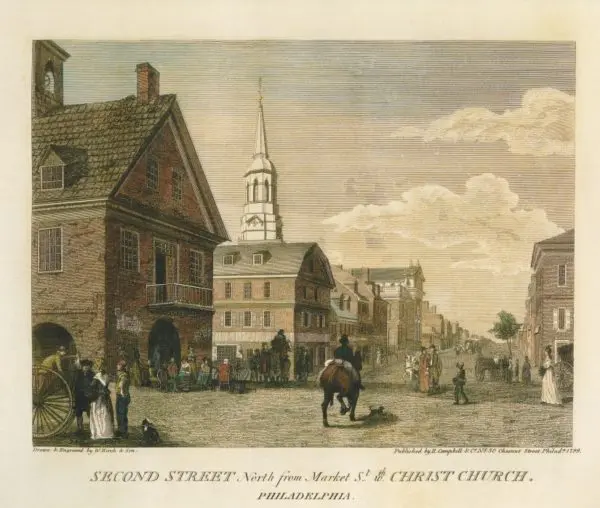History
Discover the rich past of Christ Church and its role in Revolutionary America.

The History and People of Christ Church
Christ Church, the birthplace of the American Episcopal Church, was founded in 1695 as a condition of William Penn’s Charter. Known as “The Nation’s Church,” it hosted members of the Continental Congress during the American Revolution and Presidents George Washington and John Adams in the first decade of the newly established Republic. Among early members were Benjamin and Deborah Franklin, Betsy Ross, John Penn (William Penn’s grandson), and signers of the Constitution and of the Declaration of Independence, including Robert Morris, Benjamin Rush, and Francis Hopkinson.
Dating to 1744, the current building has been cited as “our finest Early American church” and one of the finest Georgian structures in America. Its steeple (1754), financed by a lottery organized by Benjamin Franklin, is the work of Robert Smith, one of America’s earliest architects. For 56 years, the steeple made Christ Church the tallest structure in North America.
This Church further serves as a site of significance in Philadelphia’s history of slavery and abolition. It’s location alone places the church within walking distance of the waterfront where thousands of Africans first arrived upon American soil after surviving the transatlantic slave trade. 2nd & Market (then known as High St.) also shared its position with the frightening scenes of an active whipping post and nearby auction block. One man named Absalom Jones (1746-1818) began his life enslaved to a vestryman of the church. He later freed himself and his wife and went on to be ordained in the parish as the first African American Episcopal priest.
Christ Church is a privately managed historic site that is an official component of Independence National Historical Park. An active Episcopal parish, the church hosts daily historical talks and tours.

Christ Church as painted by William Strickland in 1811.
Explore more history:
Genealogy
Search our archives for information about individuals who were baptized, married or buried at Christ Church.

Education and Tourism
The properties of Christ Church highlight over 320 years of American history. Together, they welcome 250,000 tourists annually, making Christ Church among the ten most frequently visited sites in the Philadelphia region.
Christ Church is a national shrine and an active Episcopal parish. It gives inspiration and hope today as it did to the founding fathers centuries ago. Our guides infuse this resonance into their tours and talks, linking tales of early American lives with the interests of visitors who can sit in the pews of George Washington, Benjamin Rush and Sally Franklin Bache.
A visit to Christ Church will enhance your understanding of our nation’s history and its relevance to the present. Come see and feel our historical artifacts as you hear our many stories on the themes of religious tolerance and the freedom of religion.
We offer daily talks and tours at Christ Church and the Christ Church Burial Ground. Plan your visit to our grounds or contact us for more information!
Notable Attendees
Well-known historic names have sat in our pews. Here are some of the notable people who have attended services at Christ Church:

George Washington
First president of the United States and signer of the U.S. Constitution

John Adams
Second president of the United States and signer of the Declaration of Independence

Benjamin Franklin
Scientist, philosopher, printer, diplomat, signer of the Declaration of Independence and the Constitution

Betsy Ross
Seamstress who crafted first American flag

Robert Morris
Financier of the American Revolutionary War, signer of the Declaration of Independence, the Articles of Confederation, and the U.S. Constitution

Benjamin Rush
Treasurer of the US Mint, signer of the Declaration of Independence

John Penn
Eldest son of William Penn

Francis Hopkinson
Designer of first American flag, signer of the Declaration of Independence

Members of the Continental Congresses
A convention of delegates from the Thirteen Colonies that acted as the governing body of the United States during the American Revolution

